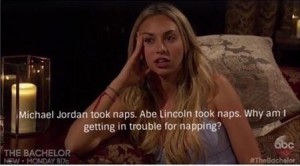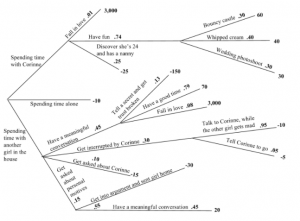The Monday night before coming back to campus consisted of me sitting, wrapped up in layers of blankets, drinking tea, and attempting to correctly answer Jeopardy questions. It was the 9th of January and 574 miles away, in her hotel room, Emily happened to be watching the same episode. We both knew the final Jeopardy question answer (“Calling him a red-headed madman, in 1889 a group of his neighbors signed a petition to ban him from his home in Arles, France.”) and my attention faded away from the TV as advertisements began to play.
Somehow I didn’t change the channel before the next show began to play. Somehow Emily didn’t either. My previous knowledge of The Bachelor extends only to the excerpts on the cover of the drama-centric magazines that are on display in the queue at the grocery store. But that night Emily and I got caught in the show, both of us amused by the antics of the participants. I sent her a text in all caps asking, “WHO EVEN IS CORINNE” and I laughed so hard my stomach hurt.
On the first day back of classes, we sat side by side in the back row of our Economics of Online Dating class. We were put in small groups and read articles about different forms of online dating — I read up on the Japanese speed dating trend of wearing surgical masks and Emily discussed match.com’s pop-up store. She turned to me near the end of class, “We need to watch the next episode of The Bachelor.”
The professor heard her and said, “Yes. We should talk about that in class on Thursday.”
Under the guise of watching it for class, we gathered with Nathan and Thomas to watch the episode. We refrained from having high expectations and were all impressed. Nathan fell off the couch from laughing and we were all jealous of the amount of time Corinne spent napping.
In class on Thursday I explained the premise of the show and used my knowledge of the show to create my own model of Nick’s choices.
I then computed the expected utility of each activity to determine who Nick should spend more time with. The math is as follows:
The expected utility of spending time with Corinne:
EU = (.01)(3000) + (.25)(-25) + (.74)[(.30)(60) + (.40)(40) + (.30)(30)]
EU = 55.57
The expected utility of spending time alone:
EU = -10
The expected utility of spending time with another girl in the house:
EU = (.45)[(.13)(-150) + (.79)(70) + (.08)(3000)] + (.30)[(.95)(-10) + (.05)(-5)] + (.15)[(.55)(-30) + (.45)(20)]
EU = 120.06
The model makes a specific set of assumptions, specifically that Nick’s personal motives within the show are to find a spouse and not someone who he will have a short romantic relationship with. Each possible outcome has been determined by previous occasions on the show (i.e., during one episode, Corinne presented Nick with a bouncy castle, so they could spend time in it together). Actions were given a positive utility if Nick appeared to enjoy them and a negative utility if Nick seemed uncomfortable in the situation. Corinne’s nature makes her a less probable future spouse; however, Nick will gain the same amount of utility from falling in love with her as he would from falling in love with anyone else in the house. To optimize his individual choice and increase his chance of falling in love, Nick should spend time with girls other than Corinne.
Given that the expected utility of spending time with Corinne is 55.57, the expected utility of spending time alone is -10, and the expected utility of spending time with another girl in the house is 120.06, Nick will gain the most utility from spending time with girls other than Corinne.
In my research for the show I found that the bachelor makes upward of $100,000 per season; however, none of the contestants are paid. In fact, some women spend upwards of $40,000 on their wardrobe for the show, which makes the entire ordeal that much more fascinating. Theoretically, for some women, spending thousands of dollars and finding a spouse within the span of a few months is a positive balance of cost and benefit.
Emily and I have managed to work in Bachelor references in every unit our Economics of Online Dating class has covered so far. In our last discussion, which was on cheap talk, Emily brought up the fact that contestants on the show have been telling Nick exactly what he wants to hear, for fear of being eliminated. The video below is reenactment of an example of a drunk contestant attempting to connect with Nick. Her attempts, as you will see, were rather peculiar (adding to the “,, ???” factor of the show) and immediately following this conversation she was sent home.
Although a good portion of The Bachelor is centered around cheap talk and putting your best self-forward, there are specific opportunity costs which validate some of the cheap talk.
- From the perspective of the females on the show: almost every one of them has stated during the show, “Do you think I would go through this if I wasn’t here for the right reasons?” Combined with their lack of funding for participating in the show, contestants literally pause their life in an attempt to find “the one.”
- From the perspective of the bachelor: approximately once an episode, the rose ceremony occurs. Every girl Nick hands a rose to stays on the show and the few he doesn’t hand a rose to are eliminated. There is an opportunity cost to giving a girl a rose and it reinforces the idea that she might be “the one.” At least she is more likely to be “the one” than the girl who was just sent home.
However, the continued presence of “the villain” (i.e., Corinne in this season) calls into question the motive of the bachelor. Is he taking the show seriously if he continues to give a rose to the girl who continually disrespects everyone else? If he’s not taking the show seriously, then what’s the point? Moreover, if he’s spending a majority of his free time with Corinne and not the other girls, is it merely cheap talk when he tells other girls that he feels as if they have created a bond? But, even if he is being serious, out of 19 seasons of The Bachelor there is only a 16% success rate and a a 5% marriage rate. (For a full list of outcomes from The Bachelor and The Bachelorette, see here.)
We’ve watched the show every week and have mostly dropped the pretense of watching it for class. There’s something therapeutic about watching a stupid television show with friends and getting caught up in the drama — you don’t need to think while watching the episode and everyone groans at the same moments and you’re all there watching it together.


